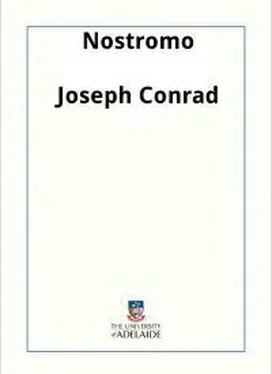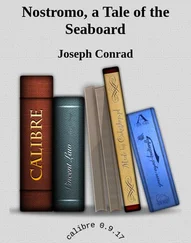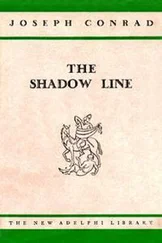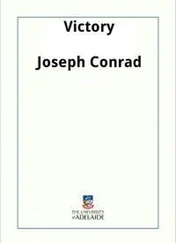Джозеф Конрад - Nostromo - A Tale of the Seaboard
Здесь есть возможность читать онлайн «Джозеф Конрад - Nostromo - A Tale of the Seaboard» весь текст электронной книги совершенно бесплатно (целиком полную версию без сокращений). В некоторых случаях можно слушать аудио, скачать через торрент в формате fb2 и присутствует краткое содержание. Год выпуска: 2006, Жанр: Классическая проза, на английском языке. Описание произведения, (предисловие) а так же отзывы посетителей доступны на портале библиотеки ЛибКат.
- Название:Nostromo: A Tale of the Seaboard
- Автор:
- Жанр:
- Год:2006
- ISBN:нет данных
- Рейтинг книги:4 / 5. Голосов: 1
-
Избранное:Добавить в избранное
- Отзывы:
-
Ваша оценка:
- 80
- 1
- 2
- 3
- 4
- 5
Nostromo: A Tale of the Seaboard: краткое содержание, описание и аннотация
Предлагаем к чтению аннотацию, описание, краткое содержание или предисловие (зависит от того, что написал сам автор книги «Nostromo: A Tale of the Seaboard»). Если вы не нашли необходимую информацию о книге — напишите в комментариях, мы постараемся отыскать её.
Nostromo: A Tale of the Seaboard — читать онлайн бесплатно полную книгу (весь текст) целиком
Ниже представлен текст книги, разбитый по страницам. Система сохранения места последней прочитанной страницы, позволяет с удобством читать онлайн бесплатно книгу «Nostromo: A Tale of the Seaboard», без необходимости каждый раз заново искать на чём Вы остановились. Поставьте закладку, и сможете в любой момент перейти на страницу, на которой закончили чтение.
Интервал:
Закладка:
Nostromo’s intention had been to sail right into the harbour; but at this thought by a sudden touch of the tiller he threw the lighter into the wind and checked her rapid way. His re-appearance with the very boat would raise suspicions, would cause surmises, would absolutely put Sotillo on the track. He himself would be arrested; and once in the Calabozo there was no saying what they would do to him to make him speak. He trusted himself, but he stood up to look round. Near by, Hermosa showed low its white surface as flat as a table, with the slight run of the sea raised by the breeze washing over its edges noisily. The lighter must be sunk at once.
He allowed her to drift with her sail aback. There was already a good deal of water in her. He allowed her to drift towards the harbour entrance, and, letting the tiller swing about, squatted down and busied himself in loosening the plug. With that out she would fill very quickly, and every lighter carried a little iron ballast—enough to make her go down when full of water. When he stood up again the noisy wash about the Hermosa sounded far away, almost inaudible; and already he could make out the shape of land about the harbour entrance. This was a desperate affair, and he was a good swimmer. A mile was nothing to him, and he knew of an easy place for landing just below the earthworks of the old abandoned fort. It occurred to him with a peculiar fascination that this fort was a good place in which to sleep the day through after so many sleepless nights.
With one blow of the tiller he unshipped for the purpose, he knocked the plug out, but did not take the trouble to lower the sail. He felt the water welling up heavily about his legs before he leaped on to the taffrail. There, upright and motionless, in his shirt and trousers only, he stood waiting. When he had felt her settle he sprang far away with a mighty splash.
At once he turned his head. The gloomy, clouded dawn from behind the mountains showed him on the smooth waters the upper corner of the sail, a dark wet triangle of canvas waving slightly to and fro. He saw it vanish, as if jerked under, and then struck out for the shore.
PART THIRD
THE LIGHTHOUSE
CHAPTER ONE
Directly the cargo boat had slipped away from the wharf and got lost in the darkness of the harbour the Europeans of Sulaco separated, to prepare for the coming of the Monterist regime, which was approaching Sulaco from the mountains, as well as from the sea.
This bit of manual work in loading the silver was their last concerted action. It ended the three days of danger, during which, according to the newspaper press of Europe, their energy had preserved the town from the calamities of popular disorder. At the shore end of the jetty, Captain Mitchell said good-night and turned back. His intention was to walk the planks of the wharf till the steamer from Esmeralda turned up. The engineers of the railway staff, collecting their Basque and Italian workmen, marched them away to the railway yards, leaving the Custom House, so well defended on the first day of the riot, standing open to the four winds of heaven. Their men had conducted themselves bravely and faithfully during the famous “three days” of Sulaco. In a great part this faithfulness and that courage had been exercised in self-defence rather than in the cause of those material interests to which Charles Gould had pinned his faith. Amongst the cries of the mob not the least loud had been the cry of death to foreigners. It was, indeed, a lucky circumstance for Sulaco that the relations of those imported workmen with the people of the country had been uniformly bad from the first.
Doctor Monygham, going to the door of Viola’s kitchen, observed this retreat marking the end of the foreign interference, this withdrawal of the army of material progress from the field of Costaguana revolutions.
Algarrobe torches carried on the outskirts of the moving body sent their penetrating aroma into his nostrils. Their light, sweeping along the front of the house, made the letters of the inscription, “Albergo d’ltalia Una,” leap out black from end to end of the long wall. His eyes blinked in the clear blaze. Several young men, mostly fair and tall, shepherding this mob of dark bronzed heads, surmounted by the glint of slanting rifle barrels, nodded to him familiarly as they went by. The doctor was a well-known character. Some of them wondered what he was doing there. Then, on the flank of their workmen they tramped on, following the line of rails.
“Withdrawing your people from the harbour?” said the doctor, addressing himself to the chief engineer of the railway, who had accompanied Charles Gould so far on his way to the town, walking by the side of the horse, with his hand on the saddle-bow. They had stopped just outside the open door to let the workmen cross the road.
“As quick as I can. We are not a political faction,” answered the engineer, meaningly. “And we are not going to give our new rulers a handle against the railway. You approve me, Gould?”
“Absolutely,” said Charles Gould’s impassive voice, high up and outside the dim parallelogram of light falling on the road through the open door.
With Sotillo expected from one side, and Pedro Montero from the other, the engineer-in-chief’s only anxiety now was to avoid a collision with either. Sulaco, for him, was a railway station, a terminus, workshops, a great accumulation of stores. As against the mob the railway defended its property, but politically the railway was neutral. He was a brave man; and in that spirit of neutrality he had carried proposals of truce to the self-appointed chiefs of the popular party, the deputies Fuentes and Gamacho. Bullets were still flying about when he had crossed the Plaza on that mission, waving above his head a white napkin belonging to the table linen of the Amarilla Club.
He was rather proud of this exploit; and reflecting that the doctor, busy all day with the wounded in the patio of the Casa Gould, had not had time to hear the news, he began a succinct narrative. He had communicated to them the intelligence from the Construction Camp as to Pedro Montero. The brother of the victorious general, he had assured them, could be expected at Sulaco at any time now. This news (as he anticipated), when shouted out of the window by Senor Gamacho, induced a rush of the mob along the Campo Road towards Rincon. The two deputies also, after shaking hands with him effusively, mounted and galloped off to meet the great man. “I have misled them a little as to the time,” the chief engineer confessed. “However hard he rides, he can scarcely get here before the morning. But my object is attained. I’ve secured several hours’ peace for the losing party. But I did not tell them anything about Sotillo, for fear they would take it into their heads to try to get hold of the harbour again, either to oppose him or welcome him—there’s no saying which. There was Gould’s silver, on which rests the remnant of our hopes. Decoud’s retreat had to be thought of, too. I think the railway has done pretty well by its friends without compromising itself hopelessly. Now the parties must be left to themselves.”
“Costaguana for the Costaguaneros,” interjected the doctor, sardonically. “It is a fine country, and they have raised a fine crop of hates, vengeance, murder, and rapine—those sons of the country.”
“Well, I am one of them,” Charles Gould’s voice sounded, calmly, “and I must be going on to see to my own crop of trouble. My wife has driven straight on, doctor?”
“Yes. All was quiet on this side. Mrs. Gould has taken the two girls with her.”
Charles Gould rode on, and the engineer-in-chief followed the doctor indoors.
Читать дальшеИнтервал:
Закладка:
Похожие книги на «Nostromo: A Tale of the Seaboard»
Представляем Вашему вниманию похожие книги на «Nostromo: A Tale of the Seaboard» списком для выбора. Мы отобрали схожую по названию и смыслу литературу в надежде предоставить читателям больше вариантов отыскать новые, интересные, ещё непрочитанные произведения.
Обсуждение, отзывы о книге «Nostromo: A Tale of the Seaboard» и просто собственные мнения читателей. Оставьте ваши комментарии, напишите, что Вы думаете о произведении, его смысле или главных героях. Укажите что конкретно понравилось, а что нет, и почему Вы так считаете.












